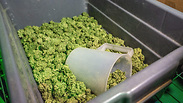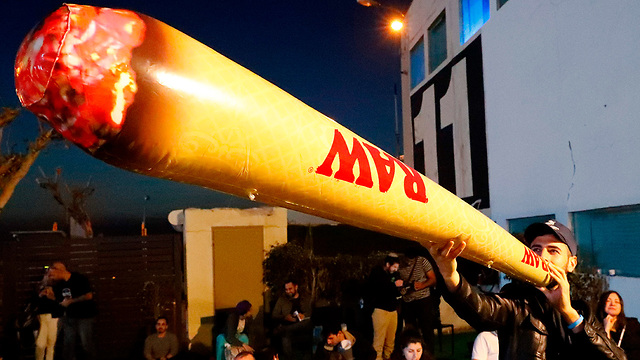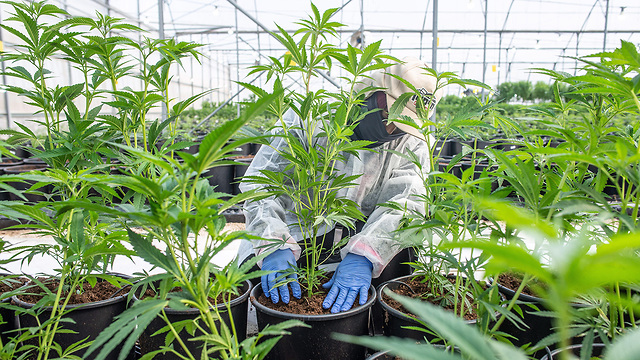
The BOL Pharma medical cannabis farm (file photo)
צילום: EPA
Health Ministry sees spike in applications to grow medical cannabis
Pending reforms don't deter more than 500 Israeli farmers who wish to go through the process of obtaining licenses to grow the highly prized plant; meanwhile, in first crime of its kind, the warehouses of the country’s leading supplier were robbed
Amid pending medical cannabis reforms, hundreds of farms across Israel have applied for permits to grow and distribute the plant, according to the Ministry of Health.

The reforms are intended to standardize prescription procedures and ensure quality. Under new guidelines, patients will purchase marijuana at pharmacies with a physician’s prescription. Hundreds of doctors will undergo training in order to be legally permitted to prescribe cannabis for treatment.
Although it was supposed to be instituted on April 1, the Ministry of Health delayed full implementation until the end of the month without specifying why. Nevertheless, ministry spokesperson Eyal Basson said that hundreds of farms had requested cultivation permits.
“So far, 565 farms have submitted requests to the Ministry of Health to obtain licenses to grow medical cannabis,” Basson said. “Of these, 384 have already passed the first round of tests in the licensing process, and this was after they underwent police checks and land ownership verification.”
Initial approval covers only planning and construction.
The spokesperson added that under the new guidelines, farms wishing to operate a medical cannabis business must abide by stringent quality standards in addition to ensuring that the site is properly secured.
“Six farms are currently approaching the end of the third stage of the licensing process and have already established farms that successfully passed security checks as well as agricultural quality tests,” Basson noted. “In addition, another eight farms have completed all the tests and have received work permits.
Some 40,000 patients use medical marijuana in Israel, where the potential market is valued at $165 million. At the moment, the government has approved the use of the plant for the treatment of a wide array of ills, including cancer, Parkinson’s, epilepsy and terminal illnesses.
Despite this, supply has not kept up with demand, and there are reports of chronic shortages. The country’s leading supplier, Tikun Olan, which currently services over 15,000 patients, recently announced a major shortfall of cannabis in flower form.
Maayan Weisberg Yoels, head of international relations at Tikun Olam, said the company was ramping up its production efforts.
“We’ve invested a lot of time and a lot in (production),” Weisberg Yoels said. “We’re doing everything we can to get back on track.”

Zehut Party supporters rally for the legalization of cannabis ahead of the April 9 elections in Tel Aviv, April 2 (צילום: AFP)
In a related development, there was an attempted robbery at a Tikun Olam warehouse in northern Israel over the weekend.
According to police, armed and masked robbers raided the facility, located near the Sea of Galilee, in the first robbery of its kind. Police spokesman Micky Rosenfeld described it as a “serious crime.”
“The security guard was robbed of his weapon, so that’s a more serious incident,” Rosenfeld said, adding that the matter was still under investigation.
Rosenfeld added that the suspects “stole a quantity of drugs, which we’re still evaluating,” and that he did not expect other facilities to be targeted.
“We’re not heightening any security specifically,” Rosenfeld elaborated. “But this was a bit of a wake-up call.”
Tikun Olam insists that no cannabis was stolen from the warehouse, as it was empty at the time.
“The burglars threatened the guards with weapons, broke into a warehouse that was empty of merchandise, and left,” Weisberg Yoels said in a written statement. “Tikun Olam clarifies that cannabis was not stolen from the farm.”
Earlier in the week, Israeli authorities partially decriminalized the recreational use of marijuana. Henceforth, possession of the plant at home is no longer an offense, although those found with small amounts of cannabis in public will be fined without undergoing criminal proceedings. The new laws do not apply to minors or soldiers.
Article written by Maya Margit. Reprinted with permission from The Media Line











